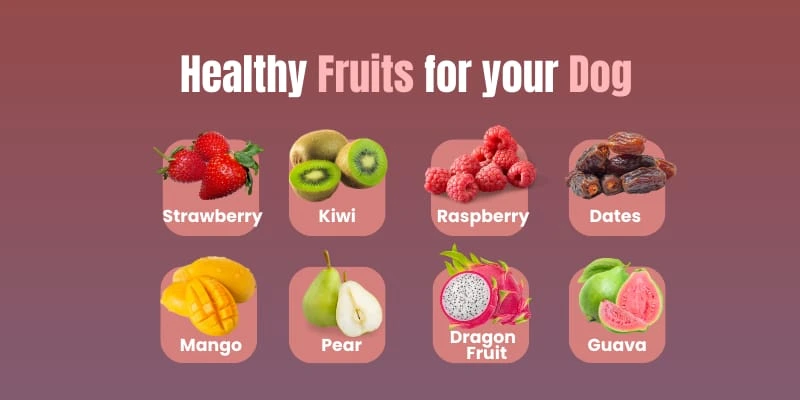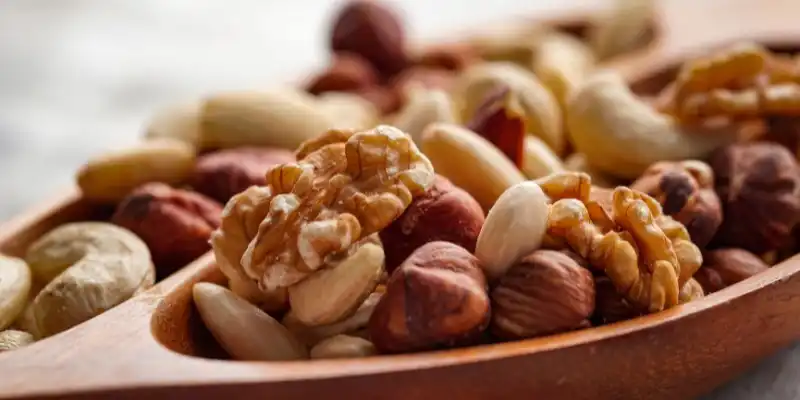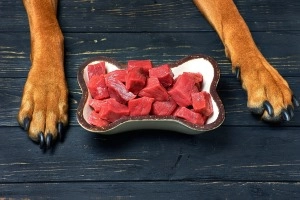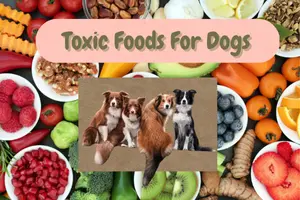Which Human Foods Are Safe For Dogs?
Published: 2 Nov 2024
Hello, fellow pet lover!
Are you excited to share your meals with your pets but don’t know which human foods dogs can eat? You’re not alone!
It’s important to remember that dogs have a distinct digestive system that doesn’t process all the foods we enjoy. Knowing which human foods are safe helps avoid accidental poisoning and ensures that every bite contributes to their well-being.
In this article, we’ll explore a variety of human foods, including fruits, vegetables, nuts, grains, and meats, that are not only safe for your dog but also delicious and nutritious.
So, let’s dive in and discover the best options for your beloved pet!
Fruits Dogs Can Safely Eat
Fruits are a delightful and nutritious addition to your dog’s diet, offering a variety of flavours and textures that can make mealtime more enjoyable. They are packed with essential vitamins, antioxidants, and fibre that contribute to your dog’s overall health. However, knowing which fruits are safe and how to prepare them properly is crucial, as some fruits can pose health risks if not handled correctly.
Here is the list of fruits that dogs can safely eat:
- Apple
- Apricot
- Banana
- Blackberry
- Blueberry
- Cranberries
- Cantaloupe
- Coconut
- Date
- Dragon Fruit
- Fig
- Guava
- Honeydew Melon
- Kiwi
- Mango
- Mulberry
- Nectarine
- Papaya
- Passion Fruit
- Peach
- Pear
- Pineapple
- Plum
- Pomegranate
- Raspberry
- Strawberry
- Tangerine
- Watermelon
Health Benefits of Fruits for Dogs:
Fruits significantly improve your dog’s digestion due to their high fibre content, promoting digestive health and regularity. Packed with vitamins and antioxidants, fruits also boost your dog’s immune system, helping them stay healthy. Their high water content keeps your dog hydrated, which is essential for overall wellness, especially in hot weather.
Additionally, the nutrients in fruits enhance skin and coat health, making your dog look and feel great. Low-calorie fruits are excellent alternatives to commercial treats, aiding in weight management while keeping your furry friend satisfied and healthy.
| Precautions to Consider While Feeding Fruits |
|---|
|

Read the complete list of benefits and portion sizes of each fruit here.
Vegetable Dogs Can Safely Eat
Many dogs enjoy the crunch and flavors of fresh vegetables, which can also serve as low-calorie snacks. Safe vegetables can enhance your dog’s health. However, not all vegetables are suitable for dogs, so it’s important to know which ones are safe.
Here is a list of vegetables that dogs can eat safely:
- Carrots
- Green Beans
- Peas
- Sweet Potatoes
- Pumpkin
- Broccoli
- Cauliflower
- Spinach
- Zucchini
- Cucumber
- Bell Peppers (all colors)
- Celery
- Radishes
- Asparagus
- Brussels Sprouts
- Beet Greens
- Eggplant
- Potatoes
- Mushrooms
- Kale
Health Benefits of Vegetables for Dogs:
Vegetables have similar nutritional content to fruits, including fibre, vitamins, and antioxidants. They improve digestion, help maintain digestive health and regularity, prevent obesity by aiding in weight management, enhance immune function, promote healthy skin and a shiny coat, and contribute to your dog’s overall well-being and appearance.
| Precautions to Consider While Feeding Vegetables |
|---|
|

Read the complete list of benefits and portion sizes of each vegetable here.
Proteins Dogs Can Safely Eat
Proteins are vital components of your dog’s diet. However, it’s important to choose safe and nutritious proteins to ensure that your dog receives the benefits without any risks.
Here is a list of proteins that dogs can safely eat:
- Chicken
- Turkey
- Beef
- Pork
- Lamb
- Fish
- Kangaroo
- Duck
- Bison
- Venison
- Goat
- Quail
- Eggs
- Organ meats
Health Benefits of Proteins for Dogs:
Proteins are essential for building and maintaining strong muscles. They aid in the healing and repair of tissues throughout the body. Proteins provide the energy needed for your dog’s daily activities and playtime. High-quality proteins boost the immune system, promoting overall health. Proteins contribute to a shiny coat and healthy skin by providing essential nutrients.
Learn the benefits and portion sizes of each protein here.

Read the complete list of benefits and portion sizes of each protein here.
Dairy Products Dogs Can Safely Eat
Dairy products can be a nutritious addition to your dog’s diet. Many dogs enjoy the creamy taste of dairy, making it a popular treat choice. However, not all dogs tolerate dairy well. Some may be lactose intolerant, leading to digestive issues. It’s essential to feed dairy in moderation and observe your dog’s reaction to avoid any digestive upset.
https://thedogshub.com/can-dogs-eat-dairy/Here is a list of dairy products that lactose-tolerant dogs can safely eat:
- Plain Yogurt
- Cottage Cheese
- Cheese
- Cheddar
- Mozzarella
- Swiss
- Gouda
- Parmesan
- Cream Cheese
- Sour Cream
- Buttermilk
- Butter
- Kefir
- Goat Milk
- Ricotta Cheese
Health Benefits of Dairy for Dogs:
Dairy products are rich in calcium, which supports strong bones and teeth. They are high in protein and aid in muscle development and repair. They provide essential vitamins like A and B12, promoting healthy vision and repairing body cells. Probiotics in Yogurt support digestive health. Also, they add different tastes and textures to your dog’s diet.
| Precautions to Consider While Feeding Dairy Product |
|---|
|
Read the complete list of benefits and portion sizes of each dairy product here.
Grains Dogs Can Safely Eat
Grains can be a valuable source of energy and nutrition for dogs. Here is a list of grains that dogs can safely eat:
- White Rice
- Brown Rice
- Oats
- Quinoa
- Barley
- Corn
- Wheat
- Rye
- Sorghum
- Bulgur
- Buckwheat
- Pasta
- Couscous
Health Benefits of Grains for Dogs:
Grains are rich in carbohydrates, providing the energy needed for daily activities. Many grains contain fiber, which supports healthy digestion and regular bowel movements. Grains offer essential vitamins and minerals that contribute to overall health. Whole grains can help dogs feel full for longer, aiding in weight control. Some grains, like oats and barley, enhance skin and coat health due to their nutrient content.
| Precautions to Consider While Feeding Grains |
|---|
|
Read the complete list of benefits and portion sizes of each grain here.
Nuts Dogs Can Safely Eat
Nuts can be a tasty treat for dogs when given in moderation. They are rich in healthy fats, protein, and various nutrients that can support your dog’s overall health.
Here is the list of all the nuts that a dog can safely eat:
- Peanuts
- Cashews
- English walnuts
- Pistachios
- Hazelnuts
- Brazil Nuts
Health Benefits of Nuts for Dogs:
Nuts are a good source of healthy fats, which support skin and coat health. They also provide a protein boost, which is essential for muscle development and energy. Nuts contain various vitamins and minerals, which contribute to overall health. Many nuts are rich in antioxidants, helping to combat free radicals in the body. Chewing on nuts can provide mental enrichment and remove tartar buildup on teeth.
| Precautions to Consider While Feeding Nuts |
|---|
|

Read the complete list of benefits and portion sizes of each nut here.
Seeds Dogs Can Safely Eat
Seeds are the powerhouse of plant-based proteins and fats. They are rich in minerals, antioxidants, fibers, and amino acids.
Here’s the list of seeds dogs can safely eat:
- Pumpkin Seeds
- Flaxseeds
- Chia Seeds
- Sunflower Seeds
- Hemp Seeds
- Sesame Seeds
- Millet Seeds
- Fennel Seeds
- Basil Seeds
- Amaranth Seeds
Health Benefits of Seeds for Dogs
Seeds can be a nutritious addition to a dog’s diet when given in moderation. They support skin health, a shiny coat, improve digestion, and provide a stronger immune system. The omega-3 fatty acids in seeds can help reduce inflammation, promoting joint health. Additionally, their protein content aids in muscle maintenance, while essential nutrients like magnesium and zinc contribute to better energy levels and vitality.
| Precautions to Consider While Feeding Seeds |
|---|
|
Explore the nutritional benefits of each seed in our article “Can Dogs Eat Seeds“
How to Safely Introduce Human Foods to Your Dog
As we all know, the digestive system of dogs works quite differently from that of humans. Here are some tips to keep in mind while introducing human food to your dog:
- Start Slowly: Begin with small portions and observe your dog for 24-48 hours for any adverse reactions.
- Watch for Allergic Reactions: After introducing new foods, look for symptoms like itching, swelling, vomiting, or diarrhea.
- Avoid Processed Foods: Stick to natural, whole foods and avoid processed items with salt, sugar, or preservatives.
- Cook Foods Properly: Serve fully cooked, plain foods. Avoid raw meats or seasoned foods, as these can be harmful.
- Introduce One Food at a Time: Offer one new food at a time to spot any adverse reactions easily.
- Consider Dog’s Size and Breed: Adjust portions based on your dog’s size, breed, and specific dietary requirements.
Conclusion
In conclusion:
All human foods dogs can eat, such as fruits, vegetables, proteins, dairy, grains, and nuts, add variety and nutrition to your dog’s diet. To prevent health issues, it’s important to introduce new foods slowly. To maintain a balanced diet and prevent excessive weight gain, human foods should constitute no more than 10% of your dog’s daily intake. In my opinion! Always seek guidance from your veterinarian before implementing major dietary changes or introducing unfamiliar foods, particularly for dogs with special nutritional requirements.
Your furry friend deserves the best! Share your experiences and insights about the treats and foods that have made a difference for your pup. Join the conversation in the comments below, and let’s help each other keep our dogs happy and healthy.
FAQs
Here are some commonly asked questions about human foods dogs can eat:
After eating food, if your dog shows symptoms such as itching, swelling, vomiting, diarrhea, or excessive panting, this means your dog is allergic to that food.
Yes, foods like chocolate, onions, garlic, grapes, raisins, and avocados are toxic to dogs and should be avoided.
Human food should make up no more than 10% of your dog’s daily caloric intake to maintain a balanced diet and avoid weight gain.
Signs include vomiting, diarrhea, bloating, lethargy, or a lack of appetite. If these symptoms appear, it means something is wrong.
Some human foods are safe for puppies, but their dietary needs are different. Consult your vet for appropriate foods for puppies.
Safe options include plain boiled chicken, white rice, sweet potatoes, plain pumpkin, and certain vegetables like carrots. However, it is best to ask the vet for personalized advice.
Some raw vegetables (like carrots and cucumbers) are safe, while others (like potatoes) should be cooked to eliminate harmful substances. Do not feed raw vegetables unless you are sure your dog can digest that specific uncooked vegetable.
Limit fruit to a small portion as a treat, typically a few pieces, depending on the size of your dog.
Foods high in antioxidants, like blueberries and pumpkin, can benefit older dogs. Foods containing omega-3 fatty acids, like fish, support joint health.
Yes, regularly offering human food can create a preference for it, leading to picky eating. It is best to maintain a consistent feeding routine with dog food as the primary diet.

- Be Respectful
- Stay Relevant
- Stay Positive
- True Feedback
- Encourage Discussion
- Avoid Spamming
- No Fake News
- Don't Copy-Paste
- No Personal Attacks

- Be Respectful
- Stay Relevant
- Stay Positive
- True Feedback
- Encourage Discussion
- Avoid Spamming
- No Fake News
- Don't Copy-Paste
- No Personal Attacks





